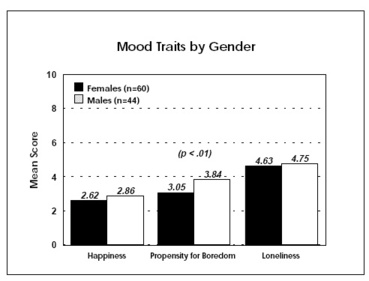Research on gender differences in gambling behavior has focused on three areas: 1) gender differences in motivation for gambling, 2) comparisons of gender-specific disordered gambling prevalence rates, and 3) gender differences in preferred gambling activities. A recent study* in Victoria, Australia examined the first two areas among gaming machine (i.e., slot machine) players. Ohtsuka et al. chose gaming machine players based on the fact that 64% of gaming machine players in Victoria are women**. A convenience sample of 104 gaming machine players were surveyed as the players waited for open machines or as they finished playing. Mood traits were measured by a 7-point scale, where 1 indicates the strongest agreement and 7 indicates the strongest disagreement with statements describing mood traits (e.g., “In general, I am a happy person”). Of the three scales (happiness, loneliness, and propensity for boredom), meaningful gender differences were found in only one; females had a significantly higher propensity for boredom than males. That is, women were more likely to agree with the statement “I get easily bored” than men. No significant differences were revealed in lifetime rates of pathological gambling (SOGS>=5) between males and females. This study therefore offered no support to the growing body of literature that reveals that males have higher rates of pathological gambling than women. This finding may imply that among specific gambling activities, such as slot machines, there is no gender disparity in disordered gambling prevalence rates. The difference in propensity for boredom may be an authentic gender difference; it may also be an artifact dependent on whether males and females were similarly interviewed while waiting for machines and after finishing. Whether the slot machine-gambling men and women won or lost at equal rates also may influence their self-reported happiness, loneliness and propensity for boredom. Both findings may also be a result of the sample–females in this study were younger than males. Further research will decipher what gender differences, if any, exist in motivation for gambling. 
Sources: *Ohtsuka, K., Bruton, E., DeLuca, L., & Borg, V. (1997). Sex differences in pathological gambling using gaming machines. Psychological Reports, 80, 1051-1057; **Buchanan, R. (1994, July 16). How gaming is changing us. The Age, 16, 18.
This public education project is funded, in part, by The Andrews Foundation.




